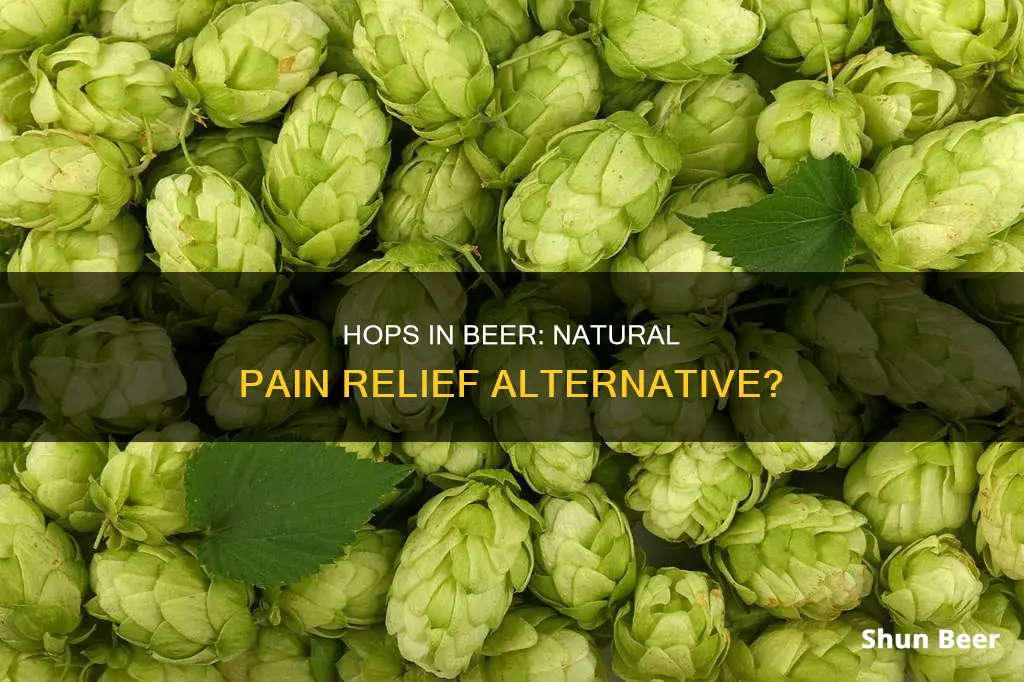
Hops, the flower of the hop plant (Humulus lupulus), are commonly used to make beer. Hops have been used medicinally for more than 2,000 years to help manage a variety of ailments. Modern research affirms that hops can help improve mood, relaxation, and sleep. Hops are also being studied as a potential treatment for depression, anxiety, and pain relief.
The hops flower is loaded with antioxidants, polyphenols, and beneficial essential oils such as linalool, which helps with oxidative stress. The flavonoid 8-prenylnaringenin found in hops is a phytoestrogen—a plant-based compound that mimics the activity of the female hormone estrogen. Hops also contain the bitter acids humulone and lupulone, which may have antimicrobial properties.
A recent study showed that mild depression, anxiety, and stress in otherwise healthy young adults were improved with daily supplementation of a hops dry extract over a four-week period. Another study found that female nurses who worked rotating shifts were able to fall asleep faster and sleep better after having non-alcoholic beer for dinner when compared to a control group.
In addition, hops have been found to have anti-inflammatory properties and potential anti-cancer properties. Rho-iso-alpha acids (RIAA), a modified extract of Humulus lupulus, have been found to be a very effective anti-inflammatory and a safer alternative to non-steroidal anti-inflammatory drugs (NSAIDs). RIAA inhibits inflammation by inhibiting the molecule that initiates the inflammatory response, known as Nuclear Factor Kappa-B or NF kappa B.
However, it is important to note that the health claims surrounding hops are not well-supported by scientific evidence, and more research is needed to determine optimal dosing strategies. Hops may also cause hypersensitivity reactions in some people and should be avoided by those with a history of estrogen receptor-positive breast cancer.
| Characteristics | Values |
|---|---|
| Scientific Name | Humulus lupulus |
| Common Name | Common Hops |
| Parts Used | Dried, flowering parts |
| Uses | Anxiety, insomnia, other sleep disorders, restlessness, tension, excitability, attention deficit-hyperactivity disorder (ADHD), nervousness, irritability, improving appetite, increasing urine flow, starting the flow of breast milk, as a bitter tonic, and for indigestion |
| Other Uses | Prostate cancer, breast cancer, ovarian cancer, high cholesterol, tuberculosis, bladder infections, intestinal cramps, an intestinal disorder called mucous colitis, nerve pain, and prolonged painful erection of the penis (priapism) |
| Side Effects | Dizziness, Drowsiness, Hypersensitivity reactions |
| Precautions | Not recommended for those who are pregnant or breastfeeding, those with hormone-sensitive cancers and conditions, or those about to undergo surgery |
| Interactions | Alcohol, estrogens, sedative medications, herbs and supplements that act as sedatives, herbs and supplements with estrogen-like properties, medications changed by the liver |
| Active Ingredients | Flavonoids, bitter acids, essential oils |
| Legal Status | Legal in the United States and sold over the counter (OTC) in supplement form |
| Suggested Dose | No universal dose; extracts have been used safely in doses of up to 300 mg daily for three months, while bitters have been used in 35 mg doses daily for the same amount of time |
What You'll Learn

Hops' sedative properties
Hops, the flower of the hop plant (Humulus lupulus), are known to have sedative properties. The sedative effects of hops are mainly due to their bitter resins, particularly the α-acid component 2-methyl-3-buten-2-ol. Hops increase the activity of the neurotransmitter γ-aminobutyric (GABA), which inhibits the central nervous system (CNS). This mechanism of action is responsible for the sedative, sleep-inducing, and anxiety-reducing effects of hops observed in several studies.
The sedative properties of hops have been demonstrated in both animal models and human clinical trials. In one study, moderate consumption of non-alcoholic beer containing hops by female nurses working rotating or night shifts resulted in improved sleep quality and reduced anxiety levels. Another study on college students found that drinking non-alcoholic beer with dinner for two weeks significantly improved sleep habits and reduced the time it took to fall asleep. Hops have also been combined with other herbs, such as valerian and passionflower, to treat insomnia effectively.
The sedative effects of hops are not limited to sleep disorders. Hops have also been studied for their potential in treating depression and other mood disorders. A small clinical trial found that supplementation with hops extract significantly reduced anxiety, stress, and depression levels in young adults with mild depression. Additionally, hops are being researched for their potential benefits in managing hot flashes, cardiovascular disease, and other health conditions.
While hops are commonly associated with beer, it is important to note that the sedative properties are attributed to specific compounds found in hops rather than the alcohol content. The unmodified hops extract used in beer has not shown the same benefits as the modified extracts used in scientific studies. Therefore, consuming beer is not recommended as a means to obtain the potential health benefits of hops. Instead, seeking the advice of a healthcare professional for appropriate supplementation is advised.
Beer and Bowel: Friend or Foe?
You may want to see also

Hops' potential to treat insomnia
Hops, the flowers of the hop plant (Humulus lupulus), have been used in herbal medicine since at least the 9th century in Europe. They have traditionally been used to treat a variety of ailments, and more recently, scientists have been studying their potential health benefits, including their usefulness in treating sleep disorders.
Hops are classified as a nervine, an herb that soothes the nervous system. They are primarily used to treat restlessness, nervousness, or anxiety, including sleep disruption that involves waking in the night, a classic insomnia pattern. Hops influence the brain's primary calming mechanism: the GABA system, which is also targeted by many pharmaceutical sedatives.
Several studies have found that hops have sedative effects and can help improve sleep quality. A 2021 study found that participants who drank non-alcoholic beer showed improvements in their sleep quality after 29 days and reported reduced levels of anxiety and stress. A 2010 review showed that 12 out of 16 studies noted measurable improvement in both sleep quality and the time it took to fall asleep for subjects taking a sleep formula with hops and valerian root. Another study found that a blend of hops and herbs was as effective as a popular sleep drug.
Hops are sometimes combined with other herbs, like valerian and passionflower, to treat insomnia. A 2013 study compared the sleeping pill Ambien (zolpidem) to a combination pill that contained hops, valerian, and passionflower. The study found that both the sleeping pill and the herbal remedy were equally effective. However, it is difficult to determine if the hops were more or less effective than the other herbs in the study.
The most common side effect of hops is sedation. If hops make you sleepy during the day, it is recommended to only use them at bedtime and adjust the dose until they improve your sleep without causing morning drowsiness. Hops should be stopped at least two weeks before surgery, as there is a concern that taking hops before surgery may amplify the effects of anesthesia.
While hops are generally considered safe, you should always consult your doctor before trying a new dietary supplement. Hops may pose some risks of side effects, particularly for people with thyroid disease or estrogen-positive breast cancer.
Andre's Beer Challenge: How Many Can He Handle?
You may want to see also

Hops' anti-inflammatory properties
Hops, the flower of the hop plant (Humulus lupulus), are commonly used to make beer. However, hops are also being researched for potential health purposes, including managing sleep disorders, hot flashes, cardiovascular disease, and depression.
Many of the perceived benefits of hops are attributed to essential oils and flavonoid compounds found in flowers, like xanthohumol and 8-prenylnaringenin. These flavonoids may possess anti-inflammatory, antioxidant, and anticancer properties. Hops also contain the bitter acids humulone and lupulone, which may have antimicrobial properties.
Hops have been found to be a very effective anti-inflammatory and a safer alternative to non-steroidal anti-inflammatory drugs (NSAIDs). Rho-iso-alpha acids (RIAA), a modified extract of Humulus lupulus, inhibit inflammation by inhibiting the molecule initiating the inflammatory response, Nuclear Factor Kappa-B or NF kappa B.
Hops have also been found to have potential anti-cancer properties. NF kappa-B is often over-activated in rapid cancer cell growth. By down-regulating NF kappa-B, Humulus has been found to assist with programmed cell death of cancer cells.
Those with autoimmune inflammatory diseases, such as rheumatoid arthritis, may also benefit from the use of the RIAA extract from Humulus. This also is attributed to the effect on NF kappa-B.
Humulus may also have an insulin-sensitizing effect, beneficial for those with diabetes and susceptible to weight gain.
Drinking Beer While on Buspar: What You Should Know
You may want to see also

Hops' potential to treat depression
Hops, the flower of the hop plant (Humulus lupulus), are commonly used to make beer. However, hops are also being researched for potential health benefits, including managing depression and other mood disorders.
A 2017 placebo-controlled clinical trial found that 36 young adults with mild depression who were given 400 milligrams of Melcalin hops daily for four weeks showed significant reductions in anxiety, stress, and depression levels compared to the placebo group. The study concluded that daily supplementation with a hops dry extract can significantly improve depression, anxiety, and stress symptoms over a four-week period.
The potential benefits of hops are attributed to essential oils and flavonoid compounds found in the flowers, such as xanthohumol and 8-prenylnaringenin. These flavonoids may possess anti-inflammatory, antioxidant, and anticancer properties. Hops also contain the bitter acids humulone and lupulone, which may have antimicrobial properties.
However, it is important to note that the health claims surrounding hops are not well-supported by scientific evidence, and more large-scale human trials are needed to establish their effectiveness in treating depression and other mood disorders.
Beer Before Bed: A Sleep Aid or Myth?
You may want to see also

Hops' potential to treat menopausal symptoms
Hops, the flowers of the hop plant, are known to contain phytoestrogens, which are plant-based compounds that mimic the action of the female sex hormone, estrogen. This is why hops are believed to be effective in treating various menopausal symptoms, including sleep disturbances, fatigue, and vaginal dryness.
Several studies have found that a daily dose of hops extract can decrease hot flashes and other vasomotor symptoms associated with menopause. In one study, 17 nurses were given hop-containing non-alcoholic beer at dinnertime for two weeks. The results suggested that the beer helped participants fall asleep faster and reduced anxiety levels.
In another study, 30 college students were asked to drink non-alcoholic beer with their dinner for 14 days. The students reported significant improvements in their sleep habits, including the time it took to fall asleep.
In a randomized, double-blind, placebo-controlled study, researchers found that hop-containing preparations significantly reduced the frequency of hot flashes compared to the control group. However, the researchers noted the potential for adverse effects with long-term supplementation and emphasized the need for further research to determine optimal dosing strategies.
Overall, while hops show potential in treating menopausal symptoms, more large-scale human trials are needed to confirm their efficacy and safety.
Cleveland's Best Breweries for Digital Nomads
You may want to see also
Frequently asked questions
Hops, the flower of the hop plant, have been used in brewing for centuries. They contain antimicrobial properties and are also being researched for potential health purposes, including managing sleep disorders, hot flashes, cardiovascular disease, and depression.
Some studies have found that hops can help with pain relief. In one study, researchers found that female nurses who worked rotating shifts were able to fall asleep faster and sleep better after having non-alcoholic beer for dinner when compared to a control group. Hops have also been found to reduce anxiety levels.
Hops are considered safe and have minimal side effects. However, some people may experience drowsiness or dizziness when consuming hops. Hops may also cause hypersensitivity reactions in some people, including an extreme allergic reaction.
People who are pregnant or breastfeeding should avoid using hops as there is not enough research to determine whether they are safe for these groups. People with estrogen-dependent conditions, such as endometriosis and certain types of breast cancer, should also avoid hops due to their potential estrogen-like activity. Hops should be stopped at least two weeks before surgery as they may amplify the effects of anesthesia.







